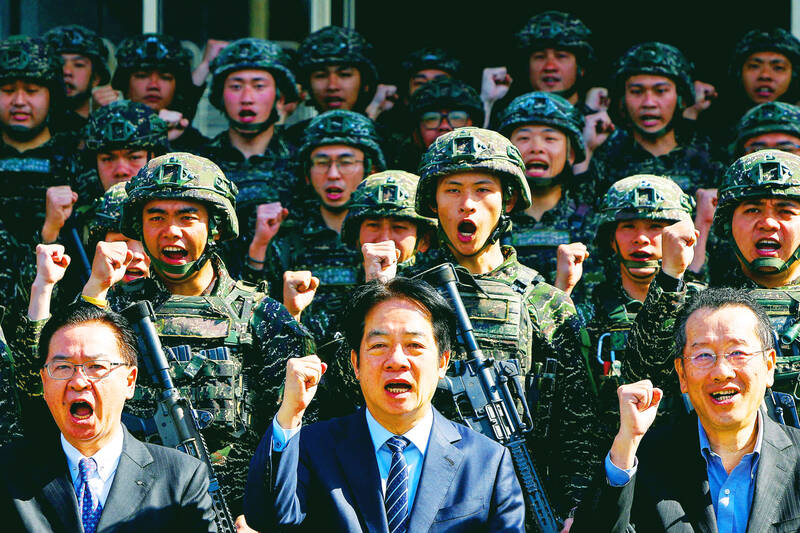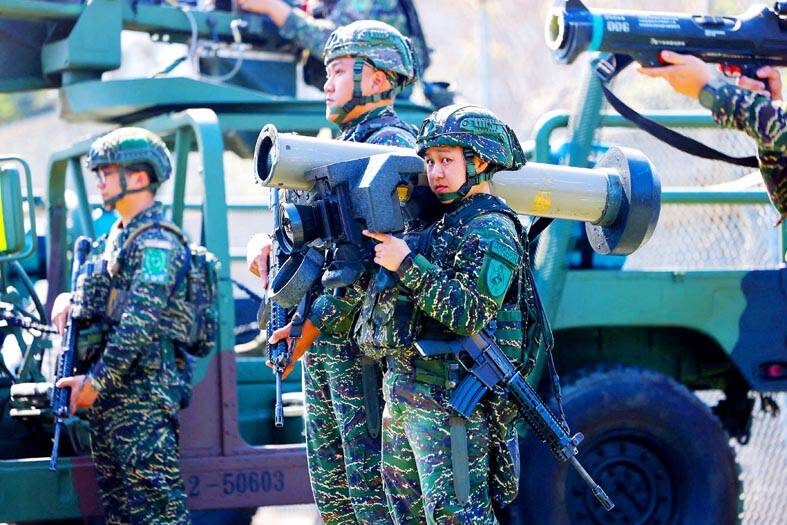President William Lai (賴清德) yesterday announced that the government would raise allowances for voluntary military service personnel and combat troops on April 1.
The Ministry of National Defense has reviewed five proposals to increase military allowances, which are separate from salaries.
The reforms would increase the allowance for personnel in the voluntary service, combat, combat air traffic control, electronic reconnaissance and cyberwarfare units, the ministry said, adding that the proposals have already been sent to the Executive Yuan for review.

Photo: Ann Wang, Reuters
Allowances for voluntary service personnel would operate on a three-tier system, Lai said during a visit to the air force’s Songshan Air Base in Taipei
Non-commissioned officers and officers below the rank of major, plus enlisted soldiers who form the majority of combat units, would receive a raise from NT$10,000 to NT$15,000, he said.
Lieutenant colonels and colonels would receive an increase by NT$4,000 to NT$14,000, while senior officers’ allowance would rise by NT$3,000 to NT$13,000, he added.

Photo: Ann Wang, Reuters
The combat unit allowance would also increase, with Category 1 combat units, who undergo the most rigorous training and have the most duties, to see an increase from NT$5,000 to NT$12,000, Lai said.
Category 2 combat support units would see a raise from NT$3,000 to NT$7,000, he said.
Increasing benefits for military personnel is a long process that requires lengthy discussion, he added.

Photo: Cheng I-hwa, AFP
Lai urged the Chinese Nationalist Party (KMT) to reconsider budget cuts and freezes on the national defense budget, as bipartisan cooperation is needed to support the armed forces.
Troops this week completed Taiwan’s first-ever immediate combat response drills.
Lai thanked the troops on behalf of the nation for their hard work and commended their excellent performance.
As a responsible member of the international community, Taiwan is committed to ensuring regional peace and stability in the Asia-Pacific region, while firmly resisting the expansion of authoritarianism, Lai said.
Taiwan would stand firm as a democratic nation and maintain the cross-strait “status quo,” he said.
In this effort, the armed forces are the bedrock of the nation and the hope of the people, he added.
Facing increasing military threats, officers are tasked with heavier workloads, the ministry said in a statement yesterday, adding that recruitment has been impacted by competition in the employment market and a lower birthrate.
Young people have been less willing to serve in the military, challenging military capability, it said.
To strengthen national defense capabilities and safeguard security in the Taiwan Strait, improving military officers’ pay is not only a short-term means to solve a personnel shortage, but also a long-term investment in talent, it added.
Additional reporting by CNA

Intelligence agents have recorded 510,000 instances of “controversial information” being spread online by the Chinese Communist Party (CCP) so far this year, the National Security Bureau (NSB) said in a report yesterday, as it warned of artificial intelligence (AI) being employed to generate destabilizing misinformation. The bureau submitted a written report to the Legislative Yuan in preparation for National Security Bureau Director-General Tsai Ming-yen’s (蔡明彥) appearance before the Foreign Affairs and National Defense Committee today. The CCP has been using cognitive warfare to divide Taiwanese society by commenting on controversial issues such as Taiwan Semiconductor Manufacturing Co’s (TSMC, 台積電) investments in the

INVESTIGATION: The case is the latest instance of a DPP figure being implicated in an espionage network accused of allegedly leaking information to Chinese intelligence Democratic Progressive Party (DPP) member Ho Jen-chieh (何仁傑) was detained and held incommunicado yesterday on suspicion of spying for China during his tenure as assistant to then-minister of foreign affairs Joseph Wu (吳釗燮). The Taipei District Prosecutors’ Office said Ho was implicated during its investigation into alleged spying activities by former Presidential Office consultant Wu Shang-yu (吳尚雨). Prosecutors said there is reason to believe Ho breached the National Security Act (國家安全法) by leaking classified Ministry of Foreign Affairs information to Chinese intelligence. Following interrogation, prosecutors petitioned the Taipei District Court to detain Ho, citing concerns over potential collusion or tampering of evidence. The

‘COMPREHENSIVE PLAN’: Lin Chia-lung said that the government was ready to talk about a variety of issues, including investment in and purchases from the US The National Stabilization Fund (NSF) yesterday announced that it would step in to staunch stock market losses for the ninth time in the nation’s history. An NSF board meeting, originally scheduled for Monday next week, was moved to yesterday after stocks plummeted in the wake of US President Donald Trump’s announcement of 32 percent tariffs on Taiwan on Wednesday last week. Board members voted to support the stock market with the NT$500 billion (US$15.15 billion) fund, with injections of funds to begin as soon as today. The NSF in 2000 injected NT$120 billion to stabilize stocks, the most ever. The lowest amount it

NEGOTIATIONS: Taiwan has good relations with Washington and the outlook for the negotiations looks promising, Minister of Economic Affairs J.W. Kuo said Taiwan’s GDP growth this year is expected to decrease by 0.43 to 1.61 percentage points due to the effects of US tariffs, National Development Council (NDC) Minister Paul Liu (劉鏡清) said at a meeting of the legislature’s Economics Committee in Taipei yesterday, citing a preliminary estimate by a private research institution. Taiwan’s economy would be significantly affected by the 32 percent “reciprocal” tariffs slapped by the US, which took effect yesterday, Liu said, adding that GDP growth could fall below 3 percent and potentially even dip below 2 percent to 1.53 percent this year. The council has commissioned another institution